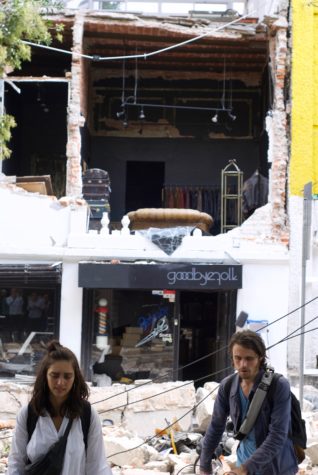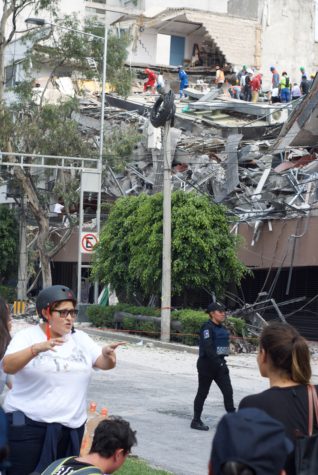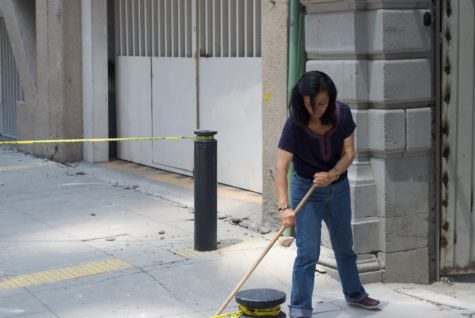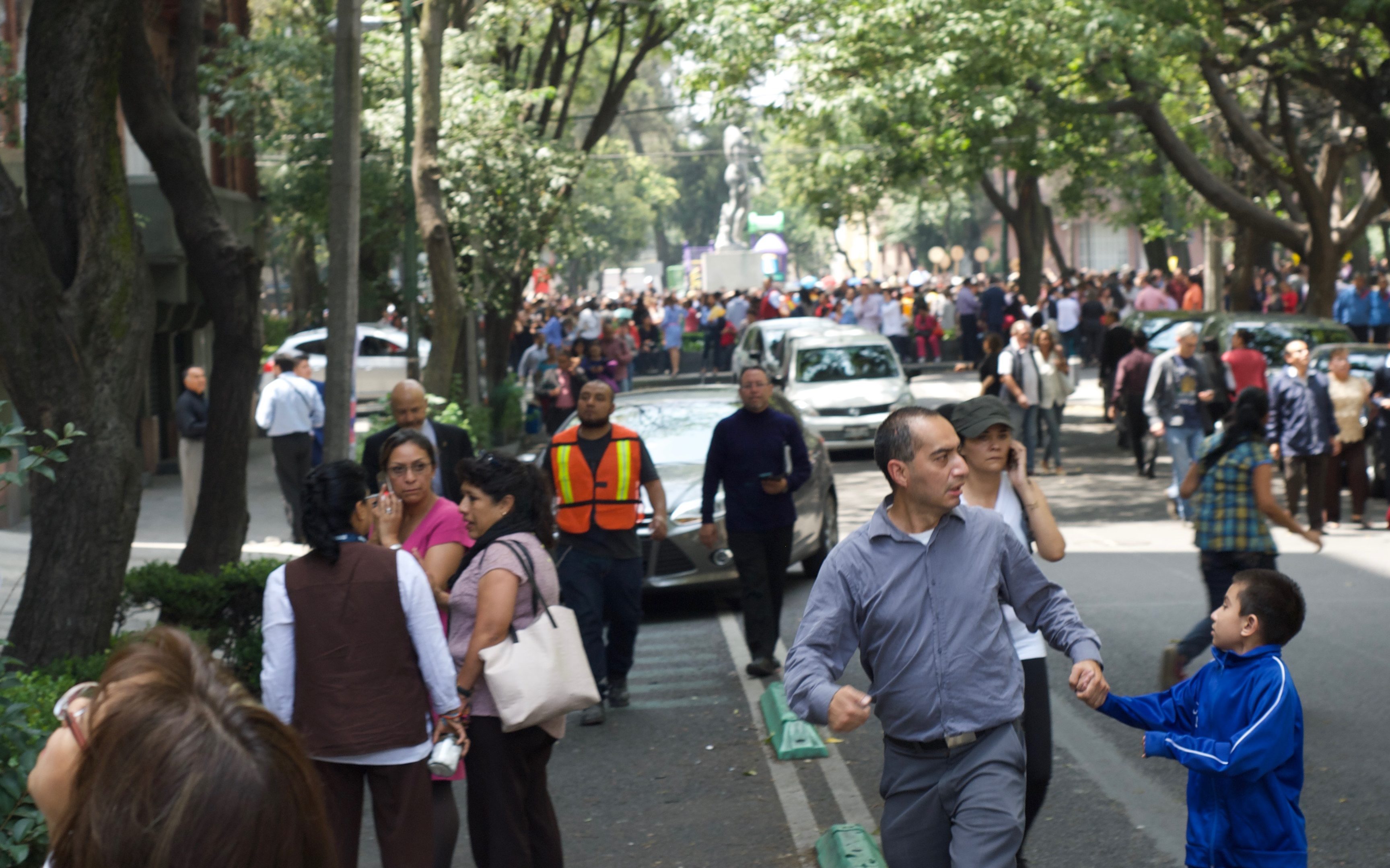You’ve never heard a kid scream until you’ve heard one who knows his daddy is no longer in control.
When the earthquake struck, I had my headphones in. I’ll be honest, I wasn’t working, I was starting to zone out a bit. Some days I’m more productive than others and this was not a productive moment. Sue me.
Normally in Mexico City it takes a minute to recognize a quake but not this time. At the first jolt I snapped the earbuds out and bolted for my baby sleeping in the nursery. Normally I would wait a moment by his door to make sure it was a big enough quake to bother waking him up but, again, not this time. This time I grabbed him out of the crib and stuffed him under it, then stuffed as much of me as I could in after him. That’s when he started screaming.
When it was over, we calmly filed out and met with some of the other folks in the building out in the street and made our way to the park around the corner. It was only when I was sure we were safe and started canvassing the neighborhood that I realized what had really just happened.
For blocks and blocks it looked exactly the same as it had the day before. A few bricks on the ground perhaps. For a moment I even lamented the fact there wouldn’t be a decent story in it for me. I saw a building with a piece of a wall missing so that I could see a desk inside. I snapped a photo.
Then I saw the first building down. It was a squat little brown thing I must have passed a hundred times – right next to that cheesy 1950’s-themed hamburger joint I swore I’d never go back to. And it was nearly pancaked. Oddly enough, the bottom floor was still intact but the three above it kind of looked like one. Neighbors were hammering away, trying to rescue those trapped inside. People who had come to their office. People taking a cooking class.
My neighbors were trapped. In other places my colleagues were trapped. My neighbors were dying. Not in some far off place, down the street. People I pass on the way to the cantina. Next to that cheesy burger joint.
Whenever a natural disaster strikes, it’s easy to find a reason why you were clever enough to escape it. Oh, look at that building, why would they live there? Well look where their house is. Well why did they get in their car during a flood? Why didn’t they get in their car during a fire? It gives us a sense of control.
It’s only when control is totally gone that you realize you never had it in the first place.
Natural disasters hold many lessons for us. But but the biggest one is to shatter our illusion of control. It’s an odd feeling for a modern person. Living a middle class life in a modern society, we tend to be a little insulated from real stress and uncertainty. I don’t mean the stress of a tough job or uncertainty about paying the bills, I mean on an evolutionary, life-or-death, fight-or-flight kind of level. In fact, I go so far as to say that leaving these things behind is the whole point of modern civilization.
 Predators, plague, even conscripted warfare, have all sort of fallen away and tragedy has become a shock rather than an expected part of life. Death really isn’t as much a part of life anymore. As a young man, I had a very cavalier attitude toward death. It was this abstract thing, like the way an angry hippo seems funny until you actually meet one. I saw danger like it was a movie. My view on it basically boiled down to that line from the 90’s action classic, Point Break: It’s not tragic to die doing what you love.
Predators, plague, even conscripted warfare, have all sort of fallen away and tragedy has become a shock rather than an expected part of life. Death really isn’t as much a part of life anymore. As a young man, I had a very cavalier attitude toward death. It was this abstract thing, like the way an angry hippo seems funny until you actually meet one. I saw danger like it was a movie. My view on it basically boiled down to that line from the 90’s action classic, Point Break: It’s not tragic to die doing what you love.
(As a side note, I based way too much of my life as a young man on sentiments from that movie. I was just your average Johnny Utah who secretly wished he was a Bodie. But that’s a whole other post.)
I even got into extreme sports, which makes sense in a civilization where normal dangers have receded. Call it danger tourism. My thing was rock climbing. And yet, every time I glimpsed real danger – a rope was dropped at the wrong time, a fall took me farther than I had planned, or that sudden realization that because of some bone-headed move a mistake now carried serious consequences – I didn’t handle it with the steely gaze of an action hero. Mostly I was just filled with the desire to go home and curl up with my girlfriend, drink some cocoa and maybe have her stroke my hair.
In other words, to get control again. If rock climbing taught me anything, it’s that humans can master fear. But loss of control is a much harder thing to conquer. Because no matter what James Bond or Jason Borne might say, we humans can’t survive in a constant state of uncertainty. We need the illusion of control.
 The Mexico City earthquake didn’t just catch me by surprise that day, it caught scientists and city planners by surprise too. You see, for decades Mexico City has been planning for a repeat of the 1985 quake. We know how Mexico City shakes and we are ready for it. More than that, I am ready for it because I was clever enough to rent a building that couldn’t possibly be damaged by a quake here. I’m in control. Or at least this is what I had told myself.
The Mexico City earthquake didn’t just catch me by surprise that day, it caught scientists and city planners by surprise too. You see, for decades Mexico City has been planning for a repeat of the 1985 quake. We know how Mexico City shakes and we are ready for it. More than that, I am ready for it because I was clever enough to rent a building that couldn’t possibly be damaged by a quake here. I’m in control. Or at least this is what I had told myself.
But seismologists and building engineers know this is horse shit. Faults slip in all kinds of strange ways and what we don’t know about them far outweighs what we do. I’ve been told this in addition to all that comforting stuff about how safe I was in my house. I just chose to hear what I wanted to hear.
Perhaps that why, after the quake, I quickly turned to my precious science writing. To call scientists and have them put the world back in order for me. To give me back my control.
What happened in Mexico City was not what was expected. The buildings that came down not the ones we expected.And regardless of whether you think the city performed better or worse than expected, it was a brutal reminder that none of us is really in control.
I don’t know what happened to that kid who talked such a cavalier game about death and danger. Maybe he got married, had a kid and got a glimpse of what real loss would look like. Maybe he never existed in the first place.
This older, wiser kid wants control and guaranteed safety. He wants to know that someone, somewhere has an explanation for everything that happens in this world. That if he just reads enough, he’ll understand what he needs to be safe. And he hates any reminder that that control is just an illusion.
Photo Credits: Erik Vance
Final Note:
Many of you might be wondering what you can do to help the victims of the Mexico City earthquake. Firstly, send money. In the weeks and months to come, that’s what aid groups will need most. But secondly, look to your own backyards. Take a peek outside your bubble of control at the forces that could pull apart your own world in an instant. Don’t assume that your home or school or hospital is safe from the coming earthquake. Many of them are woefully not. Prepare for that fire, make sure you know where to shelter from a tornado, check the smoke alarms for Christ sake.
And last but not least, help your neighbors wake up to the realities of climate change. Because while the process of warming might be slow, the day it comes knocking at your door will not be. It will come hard, and unceasingly, with the power of tide and the force of a hurricane and chances are you will not look at it steely-eyed, like an action hero. It’s only when control is totally gone that you realize you never had it in the first place.

Eric,
I have just recently discovered your writing and I am very impressed by it and grateful to you for it. I will read more of your work. I think I share with you many similar attitudes, experiences, perspectives, questions, and paths in my journey. I look forward to reading more of your writing and wish you and all the others there the very best in coping with recent events and future events